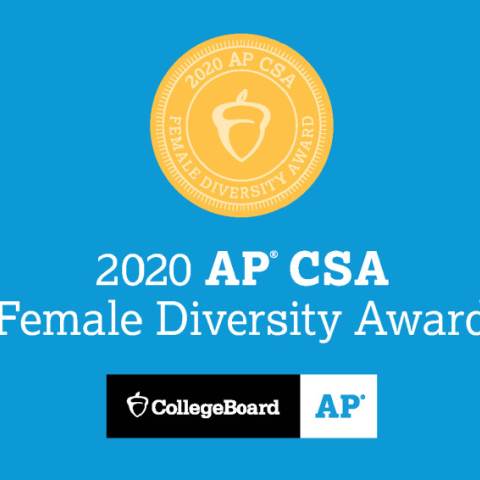

Darlington School has once again earned the College Board AP® Computer Science Female Diversity Award for achieving high female representation in AP Computer Science A. Schools honored with the AP Computer Science Female Diversity Award have expanded girls’ access in AP Computer Science courses.
Out of the 20,000 institutions that offer AP courses, 1,119 achieved either 50% or higher female representation in one of the two AP computer science courses or a percentage of the female computer science examinees meeting or exceeding that of the school’s female during the 2019-20 school year. That’s nearly 37% more than the 818 schools recognized last year. In 2020, Darlington was one of 232 recognized in the category of AP Computer Science A.
“During an unprecedented year, Darlington's female students have demonstrated perseverance and dedication in their study of AP Computer Science,” said Chad Woods, Upper School director. “We could not be more proud of them for staking their claim as the next generation of STEM and computer science professionals and we can’t wait to see their passion for next generation technology lead to lifelong success.”
“Darlington’s students need the power to shape technology, not just cope with it,” says Stefanie Sanford, College Board chief of global policy and external relations. “Young women deserve an equal opportunity to become the next generation of entrepreneurs, engineers and tech leaders. Closing the gap in computer science education empowers young women to build the future they want.”
AP Computer Science A students learn to design and implement computer programs that solve problems relevant to today’s society. The number of female AP CSA exam-takers has grown steadily, up nearly 25% since 2017. Overall AP computer science course participation has increased 79% since 2017, broadening STEM career opportunities for more students.
"Making sure technology and other STEM fields like computer science and robotics are welcoming and representative of all students is very important at Darlington," said Stefan Eady, assistant head of school for academic resources and AP Computer Science A teacher. "Having female role models in course offerings, robotics teams, and Tech Team insures a comfortable opportunity for girls in particular to explore their technology strengths."
Providing female students with access to computer science courses is critical to ensuring gender parity in the industry’s high-paying jobs and to drive innovation, creativity, and representation. The median annual wage for computer and information technology occupations was $88,240 in May 2019. However, a code.org analysis of 2017 Bureau of Labor Statistics data finds women represent just 24% of the 5 million people in computing occupations.
That’s why new College Board research about AP CSP is so encouraging. According to the data, female students who take AP CSP in high school are more than 5 times as likely to major in computer science in college, compared to similar female students who did not take CSP. The study also finds AP CSP students are nearly twice as likely to enroll in AP CSA, and that for most students, AP CSP serves as a stepping-stone to other advanced AP STEM coursework.
These findings make it all the more imperative that schools nationwide achieve gender parity in AP Computer Science classrooms. The 1,119 schools that receive this year’s AP Computer Science Female Diversity Award should serve as inspirations and models for all American high schools, where overall, female students remain under-represented in computer science classes, comprising just 34% of AP Computer Science Principles participants. So there is a long way to go to achieve equal gender representation in the field of computer science. Currently, less than half of the nation’s high schools teach foundational computer science, a clear opportunity to be addressed by strong partnerships between policymakers, the tech industry, and educators.